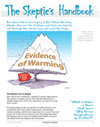|
|
Some are scoffing at the idea that rising heating costs will kill people. But check out the number-one temperature-killer in 74 million deaths across 13 countries. It’s not the extremes that we need to worry about, the deadly phrase is “mildly suboptimal temperatures”. Look at the blue finger of death in the graph below, starkly showing how irrelevant “extreme heat”, or any other ambient temperature zone, is.
Do you need an excuse to turn the heater on in winter? Low ambient room temperatures will thicken your blood.
Moderate cold accounted for as many as 6.6% of all deaths. Extreme temperatures (either cold or hot) were responsible for only 0·86%.
Join the dots — will we save more lives by:
a) making homes cold now in the hope that lower “carbon” emissions will,
b) mean less deaths from heat in 90 years time despite people probably having better access to heaters and air conditioners?
Would you sacrifice ten years of your life…
Note the big killer “moderate cold” | Click to enlarge
Cold is more likely to kill you in Sydney than in Sweden
Check out the curves below. As a percentage of the population, there […]
How will that 1mm sea level rise affect your office?
MRCTV
Apparently, no one can escape the dangers of climate change. Even when you are indoors, safe from the “extreme weather events” and flooding that we are told are the result of increases in the Earth’s temperature.
The Obama Administration has awarded $8 Million in government grants to nine universities to study the impact that climate change has on indoor air quality. The EPA defends the move by claiming that climate change’s effects on indoor air pollutants that lead to asthma, as well as mold and mildew, aren’t well understood. However, as with everything negative that occurs in the world, the Obama Administration is assuming that global warming probably has something to do with it.
Not only is the climate impact on asthma not well understood, asthma isn’t understood either. So lets ask a climate model that doesn’t work to figure out future rates of a condition we don’t know the exact cause of during imaginary weather that probably won’t happen.
Really the main effect of anthropogenic climate change is not on our lungs, it’s on our wallets.
I predict man-made-climate-change means the weather will stay […]
Humans can adapt to live in locations where the monthly average is over 40°C, and as low as -50°C. That’s a 90°C range. The world has warmed by 0.9°C in 100 years (or less, depending on adjustments). This warming was so dangerous that global population only expanded from 1.7 to 7 billion.
Now, if the IPCC are right, we might heat up by another half a degree by 2100 — shifting those extremes from -49°C up to 41°C.
Prof. Andy Pitman, one of Australia’s leading climate scientists, responds to this risk with all the usual careful analysis we’ve come to expect from mainstream climate experts. Here’s another “children won’t know what snow is” type of Global Panic quote:
“I expect by 2050 … people just don’t go outside,”
— Professor Andy Pitman, director of the ARC Centre of Excellence for Climate System Science at UNSW.
So that’s the end of golf, surfing, and picnics then. Somewhat confusingly, he also said (in the same interview) that we won’t necessarily notice that extra warmth: “… because humans acclimatise to heat quite quickly”. This is what 95% certainty looks like in 2015, ladies and gentlemen — abject panic and […]
by Jo Nova
If the “leech” doctors circa 1000AD were able to treat superbugs that modern doctors struggle with, I wonder what other knowledge has come and gone and had to be rediscovered?
How many lives have been lost because information was not there when they needed it?
Image: © The British Library Board (Royal 12 D xvii)
Judith Curry posted a link this week to a story about a medieval recipe for an “eyesalve” that rather surprised researchers when it worked against the ghastly MRSA superbug, which is resistant to almost all modern antibiotics.
The book is one of the earliest known medical texts, called Bald’s Leechbook. The recipe called for garlic, onion, wine, and bile from a cow. It was very specific — the mix had to be brewed in brass and then left for nine days. The researchers at the University of Nottingham followed it closely, then it was tested in the lab. Will it work on people, and what are the side-effects?
9 out of 10 based on 92 ratings […]
We have found the holy grail and it is chocolate. Lo, “Eating 100 g of chocolate daily linked to lowered heart disease and stroke risk”. One hundred grams a day! That’s about a quarter of the average adult woman’s total daily calorie intake. (About one sixth for a man).
So much for the 99% certain consensus that chocolate was junk food. 😉
ScienceDaily:
Eating up to 100 g of chocolate every day is linked to lowered heart disease and stroke risk. The calculations showed that compared with those who ate no chocolate higher intake was linked to an 11% lower risk of cardiovascular disease and a 25% lower risk of associated death.
They base their findings on almost 21,000 adults taking part in the EPIC-Norfolk study…
Around one in five (20%) participants said they did not eat any chocolate, but among the others, daily consumption averaged 7 g, with some eating up to 100 g.
Chocolate was associated with younger age… (we want some of that, right?)
Higher levels of consumption were associated with younger age and lower weight (BMI), waist: hip ratio, systolic blood pressure, inflammatory proteins, diabetes and more regular […]
A new study uses a ‘high resolution air temperature estimation model’ to figure out (guess) the daily air temperature pregnant women in Massachusetts might have been exposed to during their pregnancy. A whopping increase of 8.5C in the last three months was associated with a 17 gram drop in birth weight. Given that global temperatures have risen by about 1 C in the last 100 years, at the current rate, that amount of warming will arrive in 850 years. Then if this correlation has any causal role, the average 3kg baby will weigh about 0.5% less. Scared yet?
Since the researchers are talking about outdoor temperatures, I’m guessing this study will especially concern pregnant women who will be homeless, or without electricity in the year 2850. Obviously the solution is cheap coal powered air conditioners
. Why risk it?*
The Daily Mail h/t Colin
Is climate change affecting birth weights? Exposure to warmer weather during pregnancy leads to smaller babies, study claims Researchers uncovered a link between air temperature and birth weight Found exposure to high air temperature during pregnancy increases the risk of lower birth weight and can cause premature birth An increase of 8.5 °C (47.3°F) in […]
Consensus — slowing real science for decades
There is a surprising amount of interest in the cholesterol story of Matt Ridley’s in The Times and The Australian last week. Surprising to me anyway, because 15 years ago the other benevolent side of cholesterol was pretty clear online. Fifteen years is not a long time in human civilization, but it’s a long time in a human life. And in the case of the war on cholesterol, it’s been running for 40 years. How many people died sooner than they would have, because they followed expert advice?
Finally the official consensus on cholesterol is admitting defeat:
“Any day now, the US government will officially accept the advice to drop cholesterol from its list of “nutrients of concern” altogether. It wants also to “de-emphasise” saturated fat, given “the lack of evidence connecting it with cardiovascular disease”. “
In the late 1990’s it was widely known online (among health zealots) that our livers are mostly in charge of our cholesterol levels, not what’s on our dinner plates. Something like 80% of the cholesterol in our blood came from our own livers, not the food we eat. Way back then, it was […]
Of seventy four million deaths (that is quite some study) 7.7% of all deaths could be blamed on “non-optimal” temperatures according to Gasparrini et al in the Lancet. But look closely, and 7.3% of deaths were due to the cold and only 0.4% were due to the heat.
This may be part of the reason people retire to Florida, and not so much to Barrow, Alaska.
The biggest killers were not the heat waves that score the headlines, but the moderate cold. Winter kills. (Time to ban winter?)
Cold weather kills far more people than hot weather
Cold weather kills 20 times as many people as hot weather, according to an international study analyzing over 74 million deaths in 384 locations across 13 countries. The findings, published in The Lancet, also reveal that deaths due to moderately hot or cold weather substantially exceed those resulting from extreme heat waves or cold spells.
“It’s often assumed that extreme weather causes the majority of deaths, with most previous research focusing on the effects of extreme heat waves,” says lead author Dr Antonio Gasparrini from the London School of Hygiene & Tropical Medicine in the UK. “Our findings, from […]
Researchers were sure fatter people would get more dementia, so they studied two million middle-aged people for nearly a decade but were “baffled to find the exact opposite. Their sample included 45,000 cases of dementia and the obese were 30 per cent less likely to be diagnosed with it.
This contradicts previous studies and was not at all what the researchers expected, so they analyzed the data every which way they could think of but can’t explain the results. Need I say “experts” and “consensuses”?
Scientists at the London School of Hygiene and Tropical Medicine said they were baffled by the results as previous studies have shown that being overweight raises the risk. —Telegraph
Risk factors such as alcohol and smoking made little difference to the results, published in The Lancet Diabetes and Endocrinology. — Mirror
Dr Qizilbash said the findings held despite attempts to adjust for other causes of dementia and the tendency of obese people to die earlier. “We did a lot of analysis to see if we could explain it but just seems to persist. We couldn’t get rid of it so we’re left with this apparent protective effect,” he said. […]
This is the tiniest of most preliminary studies on the health effects of wind turbines, but it made it to the front page of a major newspaper. It is really just laying the groundwork for setting up a proper study. But at the end of 2012, according to the Global Wind Energy Council, there were 225,000 wind turbines operating around the world. So the real question is why has it taken so long to do an eight week study on six people in three houses looking at the effects of very low frequency ultrasound?
The Greens and Labor Party are supposed to be concerned about the effect of industry on people and cuddly animals, so where was their angst? If wind turbines ran on uranium, or the turbines were erected in inner-city areas, would the Greens have been so quiet?
Pacific Hydro deserves credit for funding and cooperating with the study which took place at Cape Bridgewater in Victoria.
Turbines may well blow ill wind
Graham Lloyd, The Australian
PEOPLE living near wind farms face a greater risk of suffering health complaints caused by the low-frequency noise generated by turbines, a groundbreaking study has found.
January 21st, 2015 | Tags: Health, Wind Power | Category: Global Warming, Health |  Print This Post | | Print This Post | |
I like to keep an eye on research on keeping our brains intact (even if it’s not far past the leeches-and-arsenic stage). Here is a tiny trial showing a bit of promise. After years of testing drugs on Alzheimer plaques without much luck, as far as I can tell, this study had the radical idea of doing a bit of everything that had seemed to delay Alzheimers — like exercise, dumping the carbs, mini-fasts, fish oil, meditation and things like that. Unlike the drug trials, this one actually seemed to work and surprisingly for as many as 9 out of 10 patients (there were only ten patients, that’s not a ratio). It’s quite neat that it did work. It has lots of potential (though not much in the way of profits for big-pharma). However it was only six months long. It may not be slowing the plaques, but then if it restores functional memory, that’s rather the point (though I worry those plaques are coming back later).
Nonetheless, if you like the idea of saving your brain. Worth reading the list below, just so you know and pass it on to those with an interest. Anything that helps, especially when […]
Remember the experts who said we should drink skim milk? A new large study suggests that full fat milk is healthier. So much for that consensus about saturated fat. There have been signs things were amiss. A few studies recently have shown that milk, yogurt and cheese consumption were associated with a lower incidence of Diabetes Type 2. Dairy didn’t seem to make the heart attacks more likely either. Hmm. So this new study of 26,000 women looked at high fat versus low fat dairy products. Over 14 years the highest consumption (which is 8, crikey, portions of full fat dairy a day) is associated with … a 23% reduction in risk compared to the low fat dairy consumers. Time to eat more Brie? Maybe, maybe not.
I won’t be taking up 8 portions of full fat dairy myself — the 23% figure is not seismic, is based on a modeled estimate (so is open to debate). I suspect it’s not the fat content that is the most important thing here, but something else entirely. The “displacement effect” confounds this sort of study. It might not be that dairy fat is so helpful, just that it is less bad that […]
People who have no cheap electricity burn wood or coal inside their homes to make dinner and stay warm. The smoke produces real pollution (as opposed to the fake kind which feeds plants). In India, some homes have pollution levels “three times higher than a typical London street”. Not surprisingly, living in smoke does not work out well for lungs and hearts. “Estimates suggest that household air pollution killed 3·5 to 4 million people in 2010. “
We can argue about the numbers and whether they are exaggerated, but there’s no doubt that millions of people would lead better lives if they had access to cheap electricity, which in practical terms means coal-fired power. In Niger, Africa, 17 million people use less electricity than Dubbo, NSW, a town of 40,000.
Where are the Greens? Children in poverty are suffering from lung damage now. The Greens priority is to spend billions to stop them dying in 2100 from seas rising at 1mm a year. How many people does expensive electricity kill? — Jo
———————————-
Household air pollution puts more than one in three people worldwide at risk of ill health, early death 8.9 out of 10 based on 61 ratings […]
Here’s a tale of how to generate headlines from circular reasoning built on brave assumptions. All it requires are some unskeptical science journal editors and gullible journalists. Et Voila!
Congratulations to Chip Knappenberger, Pat Michaels, and Anthony Watts, whose response to Åström et al was published Wednesday.
In October 2013 Åström et al claimed that global warming had killed lots of people in Stockholm, hundreds. But the first thing you need to know is that they don’t appear to start with actual mortality data in the early 1900’s. Surprised? Me too. Anthony Watts found it hard to believe . The other thing worth knowing is that extreme heat was defined as the top 2% of hot days, and in Stockholm that mean everything above a terrifying 2-day-moving-average mean temperature of 19.6�C (67 F).
From the methods:
We collected daily mortality during the period 1980-�2009 and daily temperature data for the period 1900�-2009 for Stockholm County, Sweden.
Åström 2013: Figure 2 j Temperature distribution of 2-day moving average of mean temperatures during summer months. Grey distribution, 1900–1929; black distribution, 1980–2009.
It appears the authors compared calculated death rates (using a model) from 1900-1929 with rates from 1980-2009 and concluded that […]
Our award-winning treasurer is forcing the nation to spend $8.9 billion on wind-turbines, to generate electricity which will be3- 4 times more expensive than coal powered electricity, probably won’t reduce CO2 at all, and which definitely won’t change the weather. Victoria’s windfarms have saved virtually no coal from being burnt. South Australian windfarms have saved 4% of their rated capacity in fossil fuels at a cost of $1,484 per ton.
MORE than $8.9 billion will be spent importing wind turbines because of the blowout in the Gillard government’s renewable energy target, providing few if any benefits to local industry, one of the nation’s biggest electricity generators warns.
The Australian can also reveal that a new Frontier Economics analysis commissioned by Macquarie Generation has found that the renewable energy target could slash the value of coal-fired power stations by between $11.3bn and $17.3bn – potentially having a greater impact than the carbon tax, which includes industry compensation.
In a new submission to the Climate Change Authority, Macquarie Generation said that 2500 wind turbines – costing $12.7bn – will be needed to comply with a scheme that is set to blow out the amount of renewable energy in the system to […]
Excess winter deaths are more than triple the number killed on the road.
Indur Goklany compares average daily deaths for each month in Australia and New Zealand and shows that in both countries (like in much of the rest of the world) there are more deaths in the cooler months.
While climate change legislation aims to make the world cooler, statistics show that the cooler months consistently have higher mortality.
In the unlikely event that legislation might succeed in reducing global temperatures, based on past statistical records, thousands of extra people may die as a result. In study after study, it’s clear that more people die in the colder months than in the rest of the year. The trend applies even in warm countries like Australia.
Average daily deaths for each month in Australia (left axis, black numbers) and New Zealand (right axis, grey numbers) over a ten year period.
The statistics indicate that:
For the 10-year period, 1998-2007, Australia had excess winter deaths of 6,779 per yr out of a total of 131,613 deaths per yr (avg.) This works out to 5.2% of all deaths per yr (on avg). For the 10-yr period, 1999-2008, NZ […]
Bad governments don’t just “waste millions of dollars” — mismanagement kills.
We live in one of the richest nations on Earth. But waiting times for one type of cancer treatment in Australia have blown out to the point where 2,500 people are dying every year. Why do we have money to waste on fruitless efforts to change the weather?
NEARLY 2500 cancer patients are dying prematurely each year due to poor provision of radiation therapy services, experts have estimated — with many more waiting far longer for the life-saving treatment than clinically recommended.
Graeme Morgan, former director of radiation oncology at Sydney’s Royal North Shore Hospital, said it appeared state governments were attempting to give preference to other treatments such as chemotherapy due to the high upfront costs of installing the linear accelerator machines required to deliver radiation treatments.
Yet he said the result was that nationally, 15,600 Australian cancer patients were missing out on radiation therapy each year, and 2500 dying early — figures he described as “a disgrace”.
Thirty percent of one cancer patient group was missing out on starting radiation therapy within six weeks (ideally, it ought to be within 4 weeks):
“If you don’t treat […]
The precautionary principle is exposed again for the insidious mindless posturing that it is.
Biofuel policies push more people into poverty as food prices rise and the poor are forced to spend more of their income on food. In a study published in Journal of American Physicians and Surgeons, Indur Goklany calculated the additional mortality burden of biofuels policies and found that nearly 200,000 people died in 2010 alone, because of efforts to use biofuels to reduce CO2 emissions.
Bad Government is a killer.
“Could Biofuel Policies Increase Death and Disease in Developing Countries?
Goklany (2011) estimated that the increase in the poverty headcount due to higher biofuel production between 2010 and 2004 implies 192,000 additional deaths and 6.7 million additional lost DALYs in 2010 alone.
He compared this death tally to the WHO figures for deaths attributed to global warming and finds that the biofuels policies are more deadly. (And he is not including any increase in poverty due to other anti-global warming practices).
1. Biofuel policies are retarding humanity’s age-old battle against poverty.
2. Since according to the World Health Organization’s latest estimates, 141,000 deaths and 5.4 million lost DALYs in 2004 could be attributed to global […]
While half a million people starve each year we feed 6.5% of the world grain to cars. Image credit: "Corn for cars", From Viv Forbes. Click on the image to read the carbonsense post.
After I wrote Wasting money on climate change betrays sick in The Weekend Australian, Fiona Armstrong of the Climate and Health Alliance replied with Climate action has clear public health dividend. Here’s why she’s missing the main point (saving lives).
Fiona Armstrong claims that there are substantial health gains possible from climate action, and waved the banner of scientific integrity and “fact”. Unfortunately for Armstrong, the mortal facts from countries all over the world show that more people die in colder weather. Any statistic that suggests climate change is killing people only survives as long as we ignore the number of people saved.
Medical studies rarely show such unanimity. The results stand whether you look at seasonal or daily temperatures, extremes or averages, cold locations versus warm ones, or the trend in flood deaths and droughts. No matter where you live, whether you ail in your heart, or your lungs: You’re less likely to die in warmer weather.
If we could control the planet’s thermostat, […]
|
JoNova A science presenter, writer, speaker & former TV host; author of The Skeptic's Handbook (over 200,000 copies distributed & available in 15 languages).

Jo appreciates your support to help her keep doing what she does. This blog is funded by donations. Thanks!


 Follow Jo's Tweets
Follow Jo's Tweets To report "lost" comments or defamatory and offensive remarks, email the moderators at: support.jonova AT proton.me
Statistics
The nerds have the numbers on precious metals investments on the ASX
|












Recent Comments